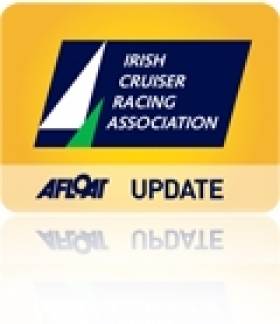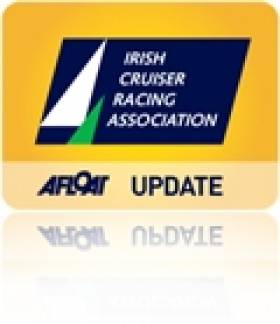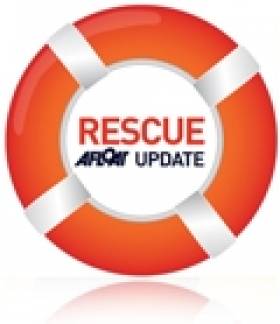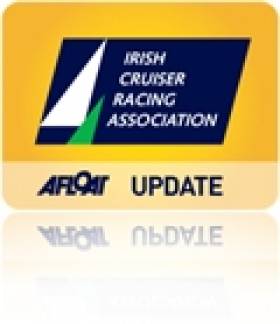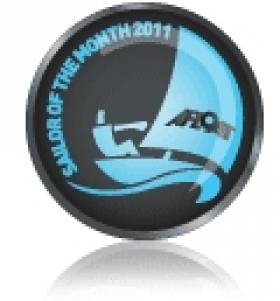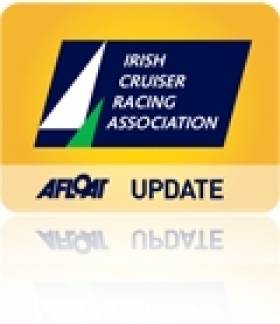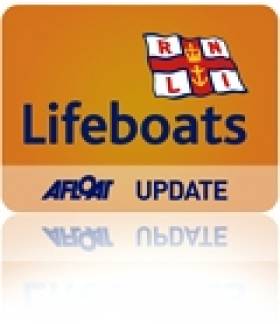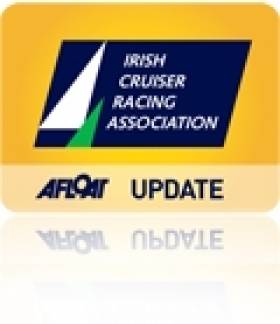Displaying items by tag: cruiser
ICRA Nationals At Royal Irish Yacht Club Hits the Spot
#cruiserracing – The Irish Cruiser-Racing Association had a weekend to celebrate after its three day Teng Tools Nationals at the Royal Irish YC in Dun Laoghaire from Friday June 13th to Sunday June 15th writes W M Nixon.
The mood afterwards was buoyant to the point of exuberance despite losing an entire day's sailing with complete calm throughout what should have been the peak-hitting Saturday. Yet thanks the crisp race management, and the extraordinary machine which is Dublin Bay race administration on top of its form, they zapped through the complete programme in a light to moderate southeast breeze on the Friday, and then took full advantage of gentle but viable onshore breezes on the Sunday to provide a full championship with a very valid set of results.
Lesser souls might well have despaired at the virtually flat wind gradient, but this was a fleet determined to have sport. With 115 boats in six classes, it hugely outshone the British ICRA Nationals taking place in the Solent at the same time, where they mustered just 45 boats in four classes. And even there, it all added to ICRA's lustre, as the winner was Anthony O'Leary's Ker 39 Antix, flagship for ICRA's Commodore's Cup challenge for Ireland next month.
As for the setting for the Irish championship, the hosting Royal Irish Yacht Club was the essence of hospitality, with Commodore James Horan leading his members in making the visitors more than welcome, while the summertime atmosphere each night in the classic clubhouse was an experience to be savoured. And the club itself fielded a remarkably good turnout of members' boats, including the overall winner, Jonathan Skerritt's Quarter Tonner Quest.
Vintage boat aficionados will pay prick up their ears at this news of the supreme champion. Quest is no Spring chicken. She was designed mostly by Marcus Hutchinson in the Rob Humphreys office in Lymington in 1987 for Justin Burke of the National YC, and with Gordon Maguire at the helm, she placed second in the 1987 Quarter Ton Worlds in Cork.
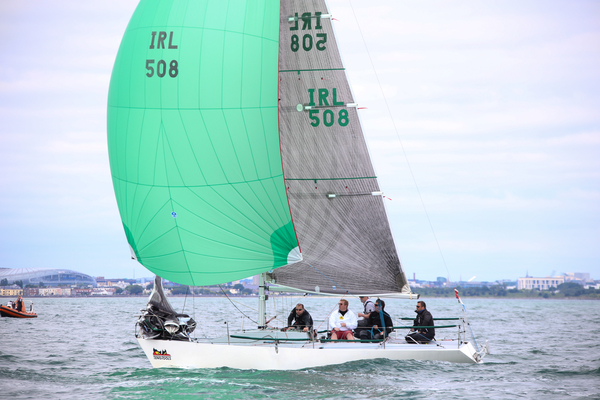
The 27-year-old Quarter Tonner Quest (Jonathan Skerritt) from the host club provided a popular overall winner. Photo: David O’Brien
With Barry Cunningham helming for Jonathan Skerritt during the ICRA Nats, and the crew including Alan Crosbie of Teng Tools, the sweet little Quest saw off the formidable challenge in Class 3 of the Kenefick clan in Tiger, racing in Dublin Bay as Nathan Kirwan Trust.
The overall win for Quest made it a remarkable regatta for classic Rob Humphreys boats. The all-conquering Humphreys Half Tonner Checkmate V of Nigel Biggs (RStGYC) notched yet another win in Class 2, her closest challenger being the Evans brothers from Howth with their near sister-ship The Big Picture, which has been up-graded in Alan Power's workshop in Malahide with a ton of helpful information from the Checkmate squad.
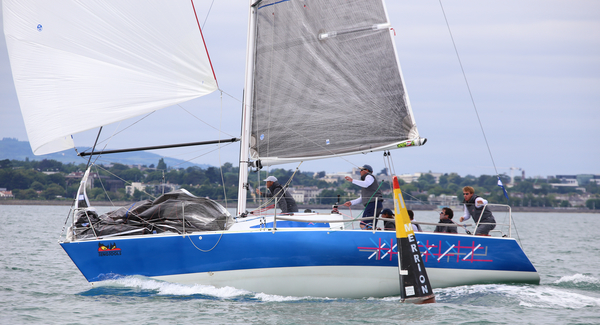
Nigel Biggs’ vintage Humphreys Half Tonner Checkmate XV has had lots of TLC lavished on her, and it shows in her appearance and performance. Photo: David O’Brien
Although the Keneficks may have had their campaign from Crosshaven pipped by Quest, in the big boat classes it was Royal Cork all the way. The J/109s set the pace in Class 1, and after the first day it looked to be going the way of Mark Mansfield helming John Maybury's Joker II. But the joke was on Joker on the Sunday, when Ian Nagle's Jelly Baby made a mighty leap to the top with the owner on the helm and Killian Collins calling the shots.
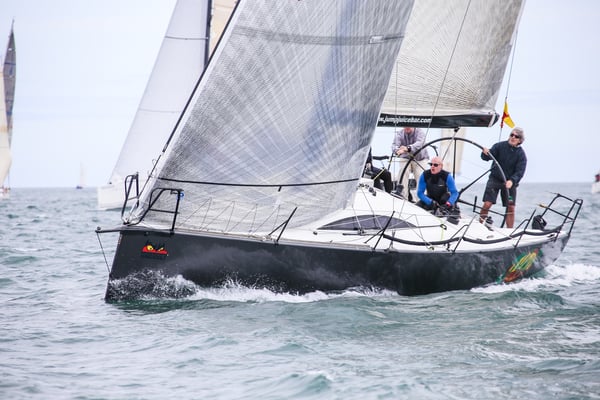
The Division 0 winning Ker 37 Jump Juice (Denise Phelan, RCYC) still looks bang up to date after several years of racing. Photo: David O’Brien
Class 0 was Jump Juice rampant. This superb Ker 37 still looks state-of-the-art, and with Conor Phelan doing the driving and David Rose calling the shots, the Juice showed an almost uncanny ability to claw her way out of setbacks on the rare occasions when things hadn't gone right, but most of the time she was so out on her own that she emerged at the end of the series ten points clear of runner-up WOW, the Farr 42 of George Sisk, RIYC.
At the other end of the fleet in size, Div 4 was won by the Sonata Asterix (Boushel, Coonihan & Meredith), while the two non-spinnaker Corinthian classes were in their own happy little world, a sort of waterborne croquet, with Paul Tully's Elan 33 White Lotus taking Div 5 while the Club Shamrock Demelza (Windsor Laudan & Steffi Ennis, Howth) swept the board in Div 6 with five wins and four bullets.
ICRA's Barry Rose of Cork, who will be team manager for the Commodore's Cup next month, was more than happy with the regatta: "For sure, most of the boats in the fleet weren't in the first flush of youth. But people are moving on from the worst of the recession, and making the best of what they've got. They're going sailing, they're sailing well, and that's what matters".
Before the Commodore's Cup, he'll be racing Cork Week with his daughter Judy McGrath on her family cruiser-racer Bonanza, a much-loved Impala 28. "We'll be racing with a roller-furling genoa", says Rose, "but you can be absolutely certain we'll give it our very best shot. The sport is going to be better than ever".
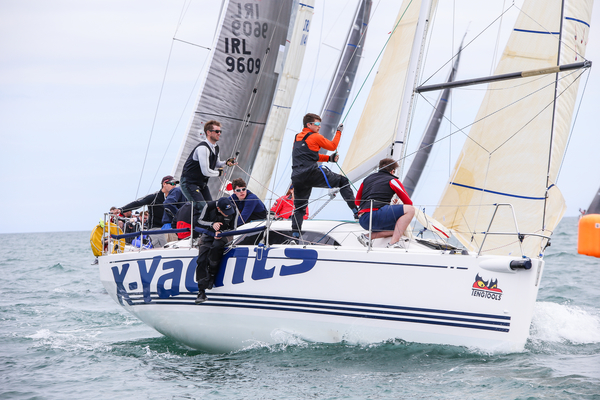
Exemple needed more wind to defend her 2013 title, and had to be content with 5th in Division 1. Photo: David O’Brien
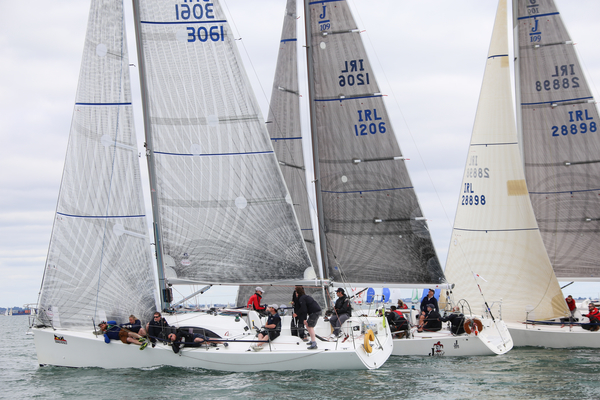
Rob O’Connell’s A35 Fools Gold from Dunmore East in a close tussle in Division 1 with John Maybury’s J/109 Joker II (RIYC) helmed by Mark Mansfield (RCYC). Joker II placed 3rd overall, while Fools Gold was 4th in a class of 26. Photo: David O’Brien

Peter Dunlop of Pwllheli SC was racing his J/109 Mojito (9047) in Division 1 against the XP 33 Bon Exemple (X Yachts UK/Colin Byrne RIYC), which was overall winner of the ICRA Nats 2013 in Tralee Bay. In Dublin Bay, they placed 15th and 5th respectively. Photo: David O’Brien

Slack Alice (Shane Statham & Trudi O’Leary) is a veteran GK 34 from Dunmore East, placing 7th out of 23 boats in Division 2. Photo: David O’Brien
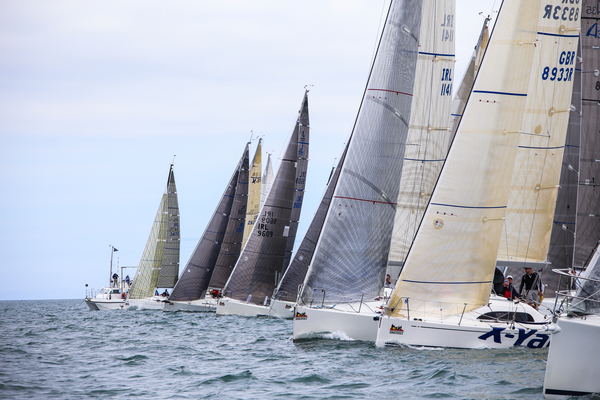
Now there’s a neat start. Division 1 gets cleanly away on Sunday, with Bon Exemple (nearest camera) successfully seeking clear air at the pin end. Photo: David O’Brien
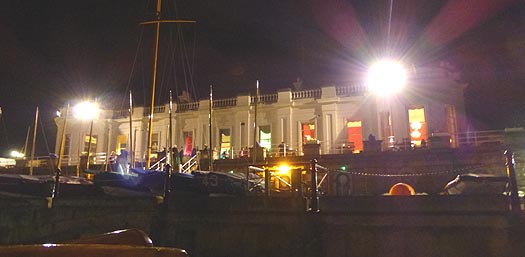
Summer night at the Royal Irish YC. The world’s oldest complete purpose-designed yacht club building provided an ideal setting for the après sailing at the ICRA Nats 2014. Photo: W M Nixon
ICRA NATS 2014 RESULTS (IRC)
Division 0: 1st Jump Juice (Ker 37, Denise Phelan, Royal Cork YC) 8pts; 2nd WOW (Farr 42, George Sisk, Royal Irish YC) 18; 3rd Roxstar (XP 38i, Finlay & Anderson, Clyde Cr C) 19; 4th First Forty Licks (First 40, Jay Colville, East Down YC) 32 (11 raced).
Division 1: 1st Jelly Baby (J/109, Ian Nagle, RCYC) 15; 2nd Rockabill V (Corby 33, Paul O'Higgins, RIYC) 24; 3rd Joker II (J/109, John Maybury, RIYC) 25, 4th Fools Gold (Robert McConnell, Waterford Harbour SC) 35.5, 5th Bon Exemple (XP 33, X-Yachts UK/Colin Byrne, RIYC) 36. (26 raced)
Division 2: 1st Checkmate XV (Humphreys Half Tonner, Nigel Biggs, Royal St George YC) 9; 2nd The Big Picture (Mg30, Richard & Michael Evans, Howth YC) 20; 3rd Fusion (Corby 25, R Colwell & B Cobbe, HYC) 22; 4th Movistar Bleu (Elan 333, Raymond Killops, Killyleagh YC) 28, 5th Dux (X 302, Anthony Gore-Grimes, HYC) 30 (23 raced).
Division 3: 1st (and Overall Winner) Quest (Humphreys Quarter Tonner, Cunningham & Skerritt, RIYC) 7; 2nd Nathan Kirwan Trust (Quarter Tonner, George Kenfick, RCYC) 19; 3rd Hard on Port (J/24, Flor O'Driscoll, RStGYC) 20, 4th Hamilton Bear (J/24, Stefan Hyde, RCYC) 25, 5th White Mischief (Sigma 33, Tim Goodbody, RIYC) 30 (19 raced).
Division 4: 1st Asterix (Hunter Sonata, Boushel, Coonihan & Meredith, DL Marina) 6, 2nd Chousikou (First 28, Declan Ward, DL Marina) 9.
Division 5: (Non-spinnaker) 1st White Lotus (Elan 33, Paul Tully, DL Marina) Div 6 (Non-spinnaker) 1st Demelza (Windsor Laudan & Steffi Ennis, HYC) (19 raced).
Big Boat Classes Won By Royal Cork Yacht Club as ICRA Championship Titles Decided on Dublin Bay
#icra – Royal Cork prowess in big boat racing shone through yesterday in Dun Laoghaire when National Cruiser handicap titles were decided on Dublin Bay in a packed final day for the ICRA championships that brought the best winds of the three day regatta for 115–cruiser–racers. It meant classes zero and one were able to sail four races for a discard after racing was lost in a dead calm on Saturday.
Winning the Class three title with the lowest score of any of the five classes, Jonathan Skerritt's Quest from the host Royal Irish Yacht Club counted three race wins and two second places in a highly consistent performance over the three days at the Teng Tools ICRA championship on Dublin Bay yesterday.
Nigel Biggs on Checkmate V had a similarly low-score with four race wins and though a fifth in yesterday's third race spoiled the straight run, the Class 2 national title went to Biggs of the Royal St. George YC.
A fourth race was added to yesterday's programme that then ran late into the afternoon for the two big-boat classes with the Royal Cork YC taking both national titles.
Denise Phelan's Jump Juice won Class Zero with a comfortable ten-point lead thanks to four race wins and two second places. Ian Nagle's Jelly Baby won the Class One title for the second time since 2012 though with 26 boats in this fleet, the win was less straight-forward despite three race wins.

Denise and Conor Phelan's Jump Juice (Ker 37) from Royal Cork was class zero winner with a ten point margin
Meanwhile there were cheers in Dun Laoghaire last night for and Irish win in Cowes, the British IRC National Championships was won outright by Anthony O'Leary on Antix in a large Class One turn-out of 20 boats. The Royal Cork YC skipper is captain of the ICRA team in this year's Commodores' Cup at the same venue next month.

(Above and below) Maintaining consistent speed in the five to eight knot winds was essential. At times even the keeping the spinnaker flying proved difficult
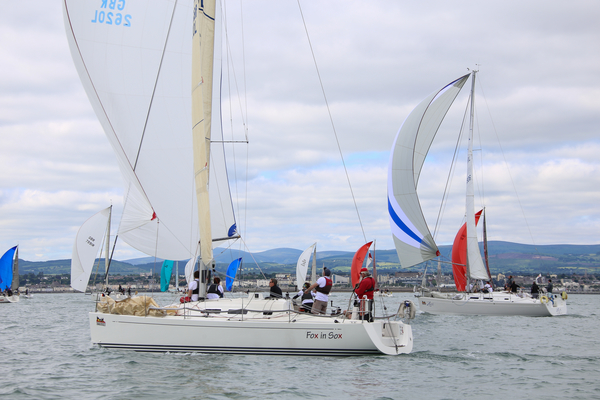

After a poor weather mark rounding the J109 Powder Monkey goes for the high lane
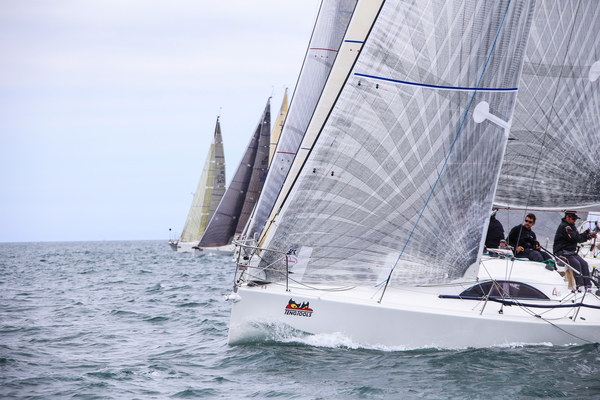
Competitive starts and finishes. Class one (above) gets away in race four on Sunday lunchtime and (below) a bow to stern class two finish between Tribal (IRL2525) of Galway Bay and the GK Westerly Slack Alice 34 from Dunmore East
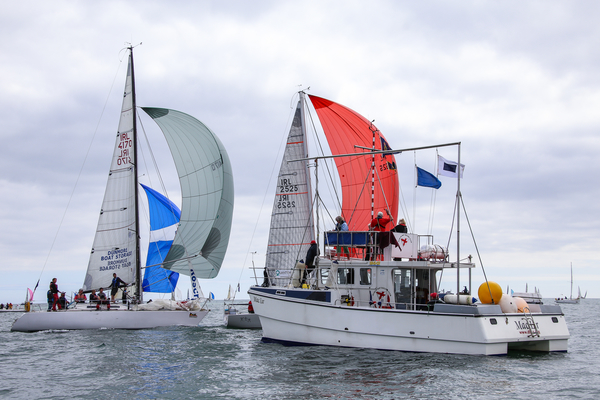

That's how it's done. Slick gybing at the Dublin Bay Merrion buoy by class two winner Checkmate V, Nigel Biggs' Humphrey's Half Tonner and (below) heading for another win off Dun Laoghaire harbour

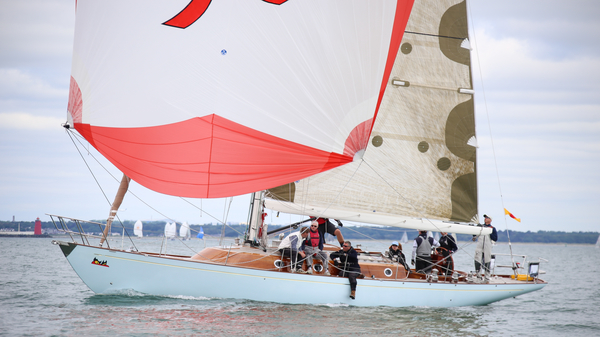
Touch of class. The spirit of James Bond came to town when the secret agent's yacht Soufriere entered in class zero
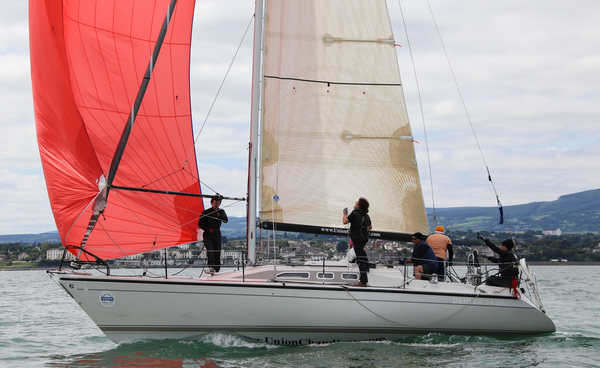
Entries came from far and near including the west coast. This Shannon estuary based Dehler 34 (above) voyaged from Foynes for the three day event. Derek Dillon's 'Big Deal', sponsored by Union Chandlery, has also enjoyed offshore success on the ISORA circuit during her trip to the east coast. Below Fox in Sox
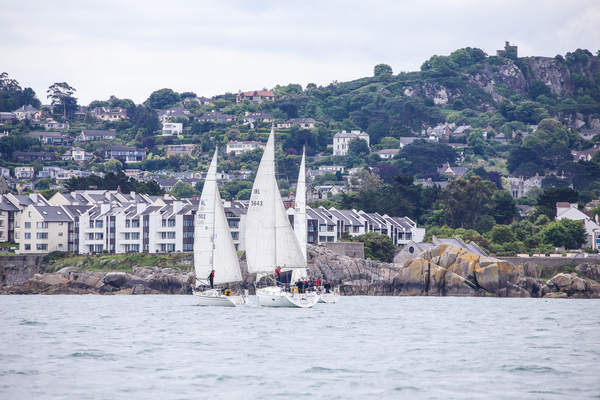
White sails racing against the Dublin coast off Dalkey
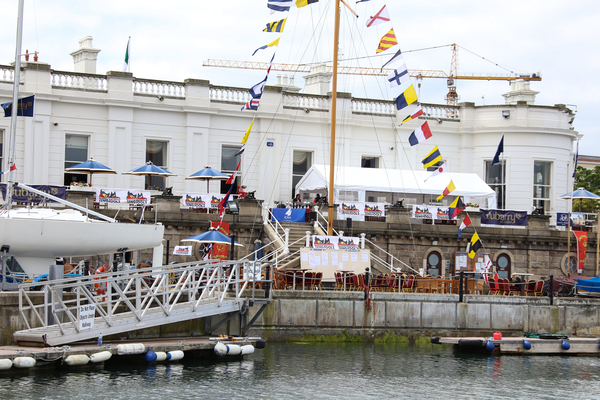
The Royal Irish Yacht Club hosted the 113–boat event with some style
A full ICRA Nationals photo report will appear in Summer Afloat magazine out next week.
Read also: WM Nixon's blog on his Friday sail with the ICRA fleet
ICRA Sailors Are Keen to Reel You Into The Cruiser Racing Game
#cruiserracing – For the ordinary participant, sailing events just seem to happen. All they have to do personally is simply turn up, and get involved each year in a programme which somehow fits together both locally and nationally. But a lot of effort goes on behind the scenes to make events run smoothly, and innovative thinking has re-shaped the annual fixtures list. W M Nixon takes a look at the Irish Cruiser Racing Association, which in twelve short years has changed the face of our sport.
On Tuesday of this week, in an anonymous hotel room just about as far from sailing waters as it is possible to get in Ireland, the Executive Committee of one of the most effective national sailing bodies met for their key pre-season meeting to monitor the provision and development of the waterborne sport of hundreds of boats, and thousands of sailors.
As they're all busy folk giving of their time on a voluntary basis, the people who run the Irish Cruiser Racing Association approach their tasks with a minimum of fuss. Convenience and efficiency is all. And those who think that some of the most important decisions in Irish sailing are taken in sedate national headquarters, or in elegant committee rooms in stylish and historic yacht club premises, would find pause for thought in this hotel boardroom in Portlaoise.
There isn't so much as a picture on the wall to distract them from their deliberations as they progress down the agenda in businesslike manner. And as for taking a breather and maybe a refreshing walk along the waterfront at the nearest sailing location - as they'd say in New York, fuggedaboudid. Portlaoise is equidistant timewise from all the main sailing centres – hence its selection for meetings of a national committee - yet in our watery island, it almost uniquely manages to be more than an hour from the nearest sailing location.
That of course may change when the big new Dublin & Leinster Reservoir is constructed a few miles north, up by Mountmellick, for we're assured that it will include a recreational boating facility. But as it's a reservoir, the boats on it won't be those catered for by ICRA, which are boats with lids and loos. And as for the sport the Association provides, hotshot young dinghy sailors used to sniffily dismiss it as "truck-racing". But in the recessional years, you didn't hear that very often, for in the thin times ICRA's racing was sometimes the only show in town, and at its best it has been a very good show indeed.
The Association has been in being for a dozen years now, introduced at a ground-breaking meeting in 2002 in Kilkenny by the late Jim Donegan from Cork, Commodore of the South Coast Offshore Racing Association, and Fintan Cairns of Dun Laoghaire. To describe Fintan merely as a former Commodore of Dublin Bay Sailing Club scarcely gets the outline of the man. In his quiet way of much voluntary work in sailing, and in his continuing enthusiasm for personally going sailing whenever and wherever it's possible, and in whatever boat is available, he's inspirational.
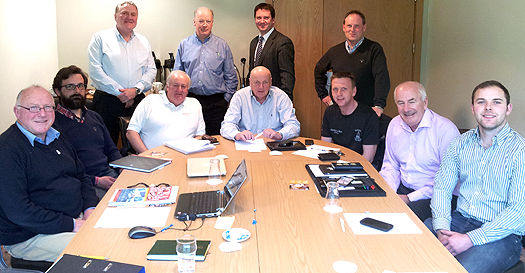
The ICRA Executive Committee meeting on Tuesday in Portlaoise includes (front row left to right); Denis Kiely (secretary ICRA), Cxema Pico (web and social media), Fintan Cairns (treasurer) Nobby Reilly (Commodore), Simon McGibney (WIORA), Barry Rose (Commodore's Cup Team Manager), and Brian Forde. Back row: Jack Roy (ISA Director), Ed Alcock (ISA Racing Manager), Ronan Enright (SCORA) and Peter Ryan (ISORA). Missing from photo is Technical Adviser Mark Mills, who'd been in attendance earlier but had to return to his Wicklow design office to complete the plans of another race winner.
Naturally there were those who wondered – this writer included – about the wisdom of trying to inaugurate a cruiser racing association based around a landmass, even when it's the Emerald Isle. Surely such racing is all about specific identification with sea areas such as the Irish Sea? But the Irish Sea Offshore Racing Association – at its height in the 1970s with its best annual entry in the season-long championship being 107 boats – was in rapid decline as lifestyles changed.
Those who in times past would have trundled off on a Thursday evening to sail maybe across channel to the start of an ISORA weekend event, and perhaps not return home until Sunday or even Monday, now found that modern expectations of inclusive family life precluded much of that. The contemporary mantra of "fun for all the family" simply cannot be applied to time-consuming offshore racing in the old-fashioned sense.
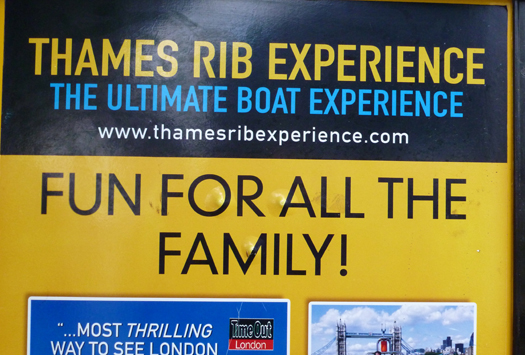
This sort of thing is all very well, but its popularity has signalled the death knell for traditional time-consuming family-unfriendly offshore racing. Photo: W M Nixon
Certainly you'll find family members who sail together on a cruiser-racer, but it's seldom as a complete family unit. So seldom, in fact, that when it occurs, it's a news item. And though quite often you will get a father and one or two sons sailing together, equally often you'll find the sons enjoy racing against the father if the old codger has managed to keep up with his sport, with no holds barred.
But in this age of conspicuous family togetherness, if cruiser-racing in anything other than in a club context in a few very local centres was going to prosper, it had to be in a format which was ultimately family-friendly, at the very least allowing whoever was the involved one – be it father, mother, son or daughter – to show the face with reasonable regularity when the rest of the family gathered.
Whether or not they do take the opportunity to be enthusiastic family members is something else altogether. What matters is that the new look to Irish offshore racing introduced the annual ICRA Nationals, held each year at a different venue, and rotating around the main centres in order to encourage those from other centres to make the voyage to the year's championship in anticipation that they would in turn be rewarded by having their club invited to host the Nationals the following year, or perhaps the year after that.
As for getting the boats to the selected venue, there might be a useful passage race – last year's Dun Laoghaire to Dingle conveniently brought boats to Tralee for the ICRA Nats 2013 – but delivery races aren't essential. The boat can be sailed to the venue by a small delivery crew, and then our marvellous new motorway system, which might have been developed with the needs of ICRA in mind, delivers the FVRO (Formerly Very Rich Owner), plus those crewmen in fulltime shore-based gainful employment, for a hectic extended weekend of racing which hopefully includes one extended coastal event in order to justify the moniker of Cruiser Racing.
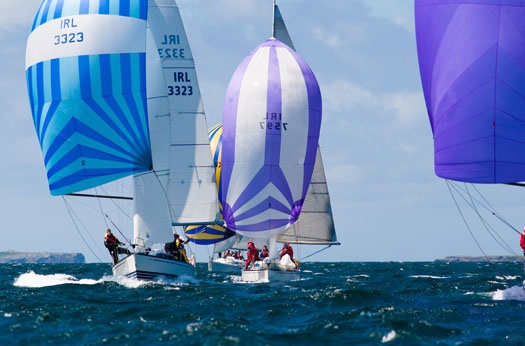
ICRA Nationals 2013 in Tralee Bay. When the sun shone, it was great. Photo: Robert Bateman
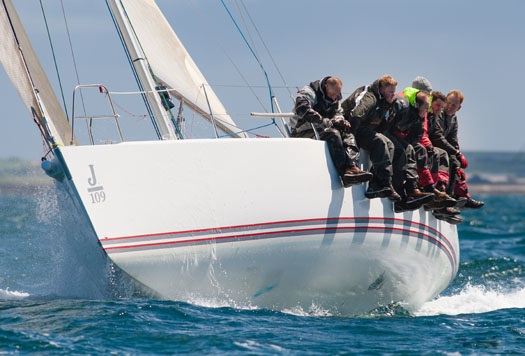
Not for the faint-hearted....the racing in Tralee Bay last year served up challenging sailing. Photo: Robert Bateman
It's not offshore racing as we used to know it, but it's what the people want, and it suits modern life. Although it may at times seem like no more than a glorified version of what any One Design keelboat class provides at its annual championship, the fact that each boat is racing to her own rating is not a drawback – it's part of the attraction. It means that in theory at least, any cruiser-racer sailed with reasonable competence is in with a chance. In fact, she and her crew are in with a double chance. Thanks to the number-crunching skills of ICRA's Denis Kiely, the backroom-boy par excellence, ICRA Championships are run with all boats under the the straight IRC rating, but also under the individual performance-related ECHO system.
It's the equivalent of having a two-strand golf major, with the usual open division, but also with people playing off handicap. Sporting purists might disdain it, but ICRA in their innate and growing wisdom know it's very important, and their double prize system reflects this.
However, the Association also aims at the clearest heights, and their work as organisers of the national team for the Commodore's Cup was crowned with the success of the outright win for Ireland in 2010, with ICRA Commodore Barry Rose of Cork in the driving seat of an outstanding campaign. That the Association's ethos is based on steady work without fuss was underlined by their reaction to becoming the Mitsubishi Motors "Club of the Year" for 2011 as a direct result. Sometimes when a club gets this award, it's received with a sense of entitlement. But in the case of ICRA, their delighted surprise was genuine, and they showed it by the entire management team turning up for the award ceremony.
Yet while the heights of the international offshore scene are within ICRA's remit, equally the Association's officers are involved with making the sport seem more accessible. I've long since given up being concerned by being told that there is a public perception of sailing as being exclusive and elitist. So what if it is? After all, any sport is competitive. And where you get competition, you eventually have winners. To get winners, you need selection. And one person's selection is another person's exclusion. Thus anyone selected seems part of an elite to those who aren't.
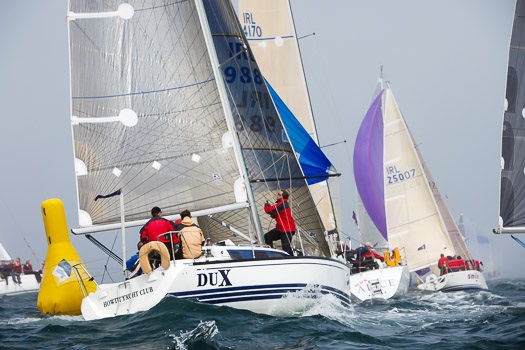
Classic ICRA racing at the Nationals in the Irish Sea, with seasoned campaigner Anthony Gore-Grimes' X 310 Dux on the way to another success. Photo: Robert Bateman
In sailing, it's something which is emphasised by the demands of campaigning a cruiser-racer. Running a successful boat-with-a-lid is like running a very intense small business. In addition to the management of the boat and equipment, you have the continuous personnel administrative demands of selecting and recruiting an effective crew, people who'll work as a team yet have individual talents which can be harnessed for the greater good. And they'll also need to contribute to the inter-personal harmony on board, often in conditions of acute physical discomfort.
To be a useful element in this, it's every bit as important to think about what you might bring to the party. Anyone who needs to be mollycoddled into a crew and is hyper-sensitive about exclusivity or elitism or whatever, is unlikely to make the grade. And it certainly won't be a gentle democracy on board, but equally an insensitive dictatorship won't work either. It's a group with a consultative leader in a continuous state of dynamic development in continually changing situations.
At the end of the race or the series, it may well be that you and your shipmates will be only too glad to see the back of each other. But then again, the shared experience, and the delight of sailing the sea when the going is good and the right judgements have been made, can be so rewarding that naturally a huge camaraderie will develop. And that of course will seem exclusive and elitist to those who haven't been part of it.
But believe me, offshore racing skippers are cunning devils, and they're always on the lookout for new crew material in all sorts of unusual ways. It is indeed like the innovative management of a successful business. A case in point was the great Denis Doyle of Cork with his remarkable partnership with the 51ft Moonduster for 20 years from 1981 onwards. In his earlier offshore racing days, Denis had been of the generation which expected the owner to be the helmsman. But by the time Moonduster came along, he'd learned to delegate - he knew that others could be better on the wheel. And in his first years with the boat, he was successfully crewed by all the top young offshore sailors and dinghy helmsmen of Crosshaven.
But gradually they moved on to boats of their own, and by the 1990s there were more boats than crews to go round. So Denis thought afresh, and made Moonduster berths available to cadets from the Naval Base up Cork Harbour at Haulbowline. But it was a case of a little learning being a dangerous thing. What the naval cadets already knew about ship handling from their professional training as sailors actually got in the way of crewing a sailing racer. So the bould Denis linked up with Commandant Barney Goulding of the Irish Army, and invited him to bring army trainees along. They were enthusiastic, but they didn't have any pre-conceived notion of what sailing involved, yet were mustard keen to learn. It worked a treat.
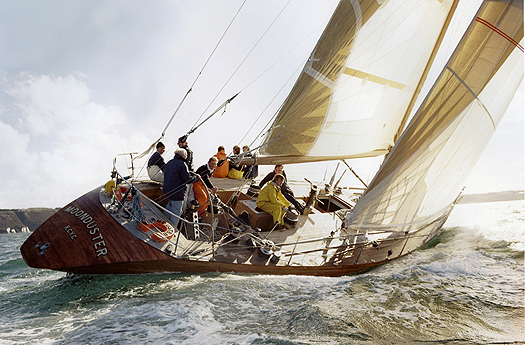
Moonduster in her element with owner Denis Doyle (unusually) at the helm. Photo: Robert Bateman
But things have moved on, and recruiting for cruiser-racer crews now has to operate in the open market. Knowing this, ICRA Commodore Nobby Reilly of Howth is organising a Come Sailing Day at his home club on Saturday May 3rd using the flotilla of SailFleet J/80s. This attracted more than 80 interested newcomers last year, they've honed the programme to make it even more user-friendly this year, and as a bonus, three selected (that word again) talents emerging from the day's activities will be invited to join the crew of a Volvo 70 which David Ryan has chartered for this year's Round Ireland Race on June 28th.
Nobby Reilly himself knows a thing or two about the wily ways of crew recruiters from his own long offshore racing career. These days he campaigns the Mills 36 Crazy Horse in partnership with Alan Chambers, and as the Gareth Craig photo shows in all its untrimmed glory here, they really do get stuck in. It may not be quite as spectacular as the mining operation mounted in a fierce squall by Gordon Maguire while running up the Solent some years ago in Cowes Week at the helm of the BH 41 Silk owned by Jocelyn Waller of Lough Derg YC - the word is that Silk's stem hit the seabed before she lifted her head again. But it was quite exciting at the time for Crazy Horse's crew, some of whom are very senior sailors whose association with Nobby goes back to the days when he and his brother Paddy were campaigning the big Humphreys 43 Comanche Raider, a boat which definitely needed a large ship's complement of all the talents, recruited just wherever they could be found.
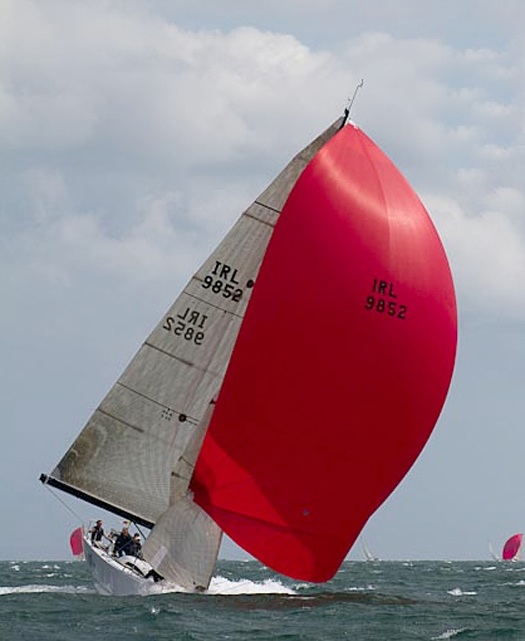
In all her glory. A little bit of sport for Crazy Horse and her crew, some of whom have been sailing with current ICRA Commodore Nobby Reilly for very many years. Photo: Gareth Craig
Next up on the programme after the Come Sailing Day is the ICRA Nationals on Dublin Bay, run from June 13th to 15th in conjunction with the Royal Irish YC. Fleet numbers are already pushing towards a satisfactory level at the hundred-plus mark, but inevitably there will be an East Coast emphasis as there's a biennial Cork Week this year in July.
Time was when the keenest boats and crews would happily take in the Scottish Series, the ICRA Nationals, the Round Ireland Race, Cork Week and the West Cork Regattas, all in one season. But times are changing. We're still recovering from an economic recession which clipped all wings. But there are signs in any case that amateur sailors increasingly prefer to put all their campaigning effort into one big chosen event, and make do with a selection of smaller local series for the rest of the season.
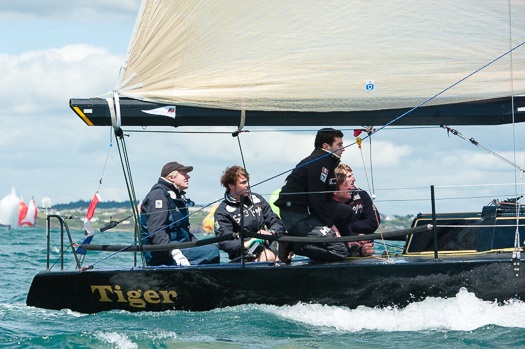
The Kenefick family's front rank Quarter Tonner Tiger from Cork will be racing ICRA Week 2014 in Dun Laoghaire as Nathan Kirwan Trust in a fund-raising campaign. Photo: Robert Bateman
It's those family demands again, something which is now so dominant that anyone of the webbed-foot tendency who expects to sail flat out from one end of the season to the other is regarded as a bit odd. So a viewpoint put forward by Afloat.ie's Water Rat about the need to rationalise the events programme even further is worthy of consideration. But for now the 2014 programme is under way, and it will be instructive to see how it develops, and how the ICRA Executive reacts.
For in addition to many members being involved in the Round Ireland at the end of June, three weeks later the 2014 Commodore's Cup is being staged at Cowes from July 19th to 26th, and Ireland is very much back in the fray after deferring to economic force majeur in 2012, when they didn't mount a defence of their 2010 victory.
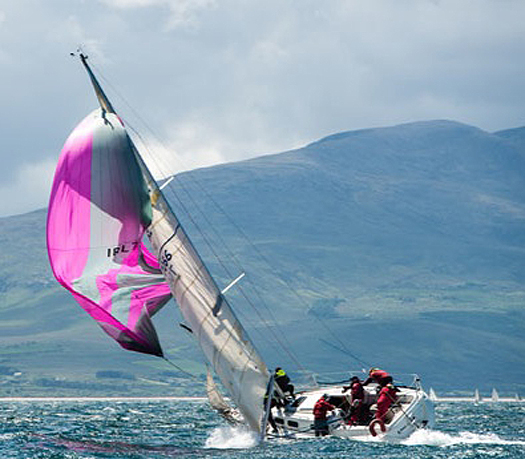
It's Kerry – big mountains, big winds, and all the sport of the ICRA Nationals 2013 at Tralee Bay SC. Photo: Robert Bateman
But at the same time the WIORA Championship is being staged on Clew Bay by Mayo YC. Clew Bay is just about as far as you can get if sailing there from the main sailing centres – once you've passed it, you're heading for home. So there was a plan to take the J/80s there and have clubs send representative crews to race them within the WIORA format. But there's just too much going on, time was against getting it all together for this formidable logistical challenge, so ICRA's man in the west Simon McGibney is concentrating on having the J/80s as a featured part of WIORA Week 2015 in Galway.
Meanwhile, the cruiser-racer and offshore season for 2014 is upon us. ICRA is once again balancing up on the tight-rope, laying on the welcome for newcomers while keeping seasoned campaigners on side. There's no other organisation in Irish sailing life which can think on its feet with the same speed and agility. And the contribution to our sport by the small voluntary staff running this big-hearted operation is a wonder to behold.
Buying a Boat? Here's a Checklist Before Choosing Your New Craft
#BOATS FOR SALE – It's definitely that time of year again when thoughts turn to getting on the water. If you're buying a boat for the first time, it's probably because you've spent a bit of time on one and like the whole idea. One thing we can guarantee: being on the water is great fun, but it's more than that – it's a way of life. If you take to it, you will begin to see the the world from a different perspective and your leisure time will take on a whole new meaning.
Find a boat that Suits You and Your Pocket
The first and most important consideration is that the boat you buy matches your lifestyle, so you need to know what you want on the water.
So, establish what it is that you most want to do with your boat: the size, how far – or how near – you want to travel, how many people you want to accommodate, what sports events you plan to enter, and whether you'll be inland or offshore.
"A good dealer will ask these questions of a prospective client, and find out exactly what it is they expect from their time on the water," says Tadhg Foley of Marine Action Boats in Tipperary. "Forcing an unsuitable boat onto a client will just backfire on the dealer, as they won't come back for their second – or third – boat, so it's best to be definite about your requirements so the dealer can match boat with buyer. Do you want to ski? Are you going fishing? All these things make a big difference in the type of craft you'll need."
Martin Salmon of MGM Boats says it's important that the buyer gets good value from his boat, in that they get to use it often and well. "We'll often include tuition in a boat-buyer's package," he says, "or make sure that there's an engineer and skipper on board when a new boat owner takes delivery – a 'comprehensive handover', because the more the boat is used, the better."
"If a prospective client has been referred to us by an existing client, we'll often show them a selection of craft and suggest they discuss it with the experienced sailor who referred them to us in the first place," says Hugh Mockler of HM Yachts in Crosshaven. "If they're reluctant to join a sailing school, individual tuition on the new boat can easily be arranged, and joining a club is an excellent way to get into the 'time on the water' way of life. With an active social side and maybe the odd cruise-in-company with like-minded companions, the new boater will soon see the benefits", says Hugh.
Brand New or Pre-Owned
Budget is a big consideration, of course, but there are other factors that will affect whether you buy a new or pre-owned boat.
New boats may suit those who are planning to keep their craft for some time, have been on the water before and know exactly what they want.
However, a five-year-old model could be as much as half the price of a new one, giving you a whole lot more boat for your money. Even a year-old boat will have depreciated by between 20-25% since it left the 'showroom'. There's also the possibility that any snags will be have been ironed out by the previous owner, particularly if they're a careful boater. Martin Salmon of MGM says if you're worred about depreciation, then "buying a used boat can be a good investment if you choose carefully. They don't depreciate as much from the purchase price."
As for the type of boat to buy, the choice is very wide – there are over 40 types out there, and one of them will fit you. Again, it's very much dependant on what you want from your water-based experience. See our 'What's on Offer' guide to boat types and uses.
Brokerage or Private Sale?
As with any big purchase, if you're buying a new boat it's recommended you either buy direct from the manufacturing boatyard or from one of their officially-appointed dealers. Any boat advertised as new that does not appear to originate from either of these sources should be checked out carefully with the boat builder.
There are several routes to buying used boats: from a dealer who has boats in stock as part-exchange; from a broker who sells the boat on behalf of the owner; or from the owners themselves, in a private sale.
Donal McClement of Crosshaven Boatyard in Cork recommends the use of a reputable broker for advice. "The vendor pays the broker's fees, not the buyer, and you have the advantage of the years of experience a broker can bring to the transaction. It's well worth it."
All the necessary paperwork and checks should be in place when buying from dealers and brokers, and their reputation and future business success depends on making their clients happy.
The majority of private sellers are genuine. However, there's a possibility that you're being offered a boat for sale that's stolen, or there's a fraudulent transaction going on. This is the risk taken when not buying from an established business. However, there are precautions you can take to protect yourself and your boating future.
Set the Conditions Before You View
It's a good idea to decide before viewing any boat that you will not buy the first boat you see, or even on the same day you see it. The initial viewing should be part one of a sequence of events to ensure the boat you fancy is really the one for you.
The first view – If it's a new boat, your first visit will be to look over the boat and others in the same range, probably. You'll want to find out about optional extras, colours, delivery lead times, warranty, part exchange (if applicable) and payment terms, as well as price.
A used boat should be checked out for condition; identify any rectification, repairs or improvement work that might need to be done, confirm the asking price and payment terms, and decide if, having examined the boat, you want a sea trial.
The sea trial – If you can take the boat out the first day you see it, so much the better. If not, arrange another time for a sea trial – you have to know how the boat handles on the water.
If it's a power boat, it's good if the engine is cold and not already warmed up when you're taking it out. It could be that it's difficult to start or it may smoke a lot from cold, and with an already-warm engine it's impossible to tell.
Check the boat's steering and handling capabilities at slow speeds, in confined situations. If it's a sea-going boat, see how much it rolls and pitches, taking waves of different sizes at alternative angles; and if it's a planing boat, check how quickly and easily it gets on the plane. Make a mental note of the sea conditions – a boat's performance is relative to the sea condition in which it's operating.
If it's a sailing boat, try different points of sail, sailing into and away from the wind and check the boat's manoeuvrability, stability and performance of the sails and rigging under load. And also check how the boat performs on the engine. At the end of the sea trial, re-examine the bilges, engine compartment and the boat generally for any evidence of oil or water leaks.
Remember also to check used boats for title, charges and theft. "The single most important thing you need, if your boat is a post-1985 model, is proof of payment of VAT," says Donal McClement. "If VAT is paid in one member state, it is considered paid in all member states." Proof of VAT payment can take the form of the original invoice or VAT receipt: "It's unlikely that people would have the VAT receipt, though, as it would come from the original dealer," says Donal. "However, liability rests with the buyer if no proof of payment is provided."
With a used boat there are some checks and information gathering that you should carry out. These checks concern EU RCD compliance, validation of Hull Indentification Number (HIN) number, Declaration of Conformity, the aforementioned evidence of VAT compliance and searches for finance outstanding.
Again, according to Donal at Crosshaven, the CE plate/stamp on the boat is vitally important, so make sure it's there.
When you've seen evidence of build and VAT compliance, and have all of the information that you need to carry out your basic security checks, you should take some time to 'think about it' and get these checks done.
Assuming the boat passes your essential security checks, and that this boat is definitely the one for you, arrange for a professional surveyor to examine the boat. Use a reputable surveyor.
Cutting the Middleman
Bernard Gallagher of Dublin's BJ Marine believes purchasers get the best value from their local dealer: "Most Irish boatyards are dealing direct with the manufacturer, so there's no middle man." Gallagher says the larger manufacturers are offering very good value to their dealers; "We've never bought better, so we can pass on those savings to our customers." He also says it's never been easier to check the value of boats, with access to the internet and boating publications.
So, before entering into negotiations with a seller, you need to decide what price you're prepared to offer and at what price you're prepared to settle.
With a new boat, it's quite rare to pay the brochure price. What you may be offered as a discount depends on many factors such as availability, demand, and model age – it's all down to timing and negotiation.
With used boats, it's less straightforward. The simplest way is to compare the boat you're interested in with other boats for sale of the same make and model. But be sure you're comparing like with like. Age, condition and specification make a difference as well as the ancillary equipment that's included in the sale, so make allowances for any differences in these.
Negotiating A Deal
New boats – Timing is important when buying a new boat. Special deals are often available during boat shows, towards the financial year-end of the boat builder or dealer, and when a model is due to be superseded by an updated version. So do all your research, be aware of model cycles, decide what you want to buy and then try to negotiate at the best time.
If discounts aren't on offer or are lower than you would wish, you might do better to negotiate the inclusion of ancillary equipment in the price; items such as ropes, fenders, lifejackets, GPS, depth sounders, chart plotters and even deck cushions, a CD system or a cooler bag. The value to you is higher than it costs the dealer to supply these items, so having some of them 'thrown in' can be a good compromise.
Used boats – With used boats, the selling price might represent great value as it is, but then again it might not: only your research will tell you which way round it is.
However, any combination of the following should help you to persuade the seller that there is room for negotiation:
• Ancillary equipment that is missing, in poor condition, not working, out of date or not included in the sale;
• Faults and rectification work required and identified by you or your boat surveyor;
• Lack of documentation such as:
– Original sales invoice and evidence of VAT compliance
– Builders certificate and CE declaration of conformity
– Boat manual
– Service history
– Current safety certificate on a canal boat
– VHF radio licence (if applicable). Note: Donal McClement of Crosshaven Boatyard reminded us that the VHF radio licence stays with the craft, "it used to stay with the owner, but now belongs to the boat."
Financing Your Boat
When buying through a dealer or broker, expect to be asked for a deposit, which may be non-refundable if you back out of the transaction. So be sure that you want to buy and have the funds available before you commit.
If you require finance, dealer and brokers may be able to introduce you to alternative sources of borrowing (for which they may receive a commission, so bear this in mind when negotiating).
MGM waiver their commission in lots of cases, according to Salmon. "In the current fiscal climate where finance companies are looking at every detail, it's more important to have the client get finance for the boat they want."
With a marine mortgage, you can normally obtain up to 80% of the purchase price secured against your boat. Before granting a marine mortgage the finance house will require a full, out-of-water survey and valuation on boats other than brand new boats. The lender will also check that there is no finance outstanding on a new boat.
Dealing with a private individual is slightly more complex. They are not professional sellers and will not necessarily know how to formalise the transaction to help protect not only themselves but you as well. So it is as much in your interests as theirs to ensure all potential purchasing disasters are avoided.
What's out there?
Inland Boats
Canal and narrowboats – Usually built of steel, the hulls can last a lifetime if minded. Ideal for pottering peacefully about the canals and less tidal rivers at about 4mph, for days or even weeks at a time. These boats are low maintenance, very economic on fuel and often include most home comforts.
River boats – Usually built of GRP and lighter than their steel counterparts, they're more powerful than narrowboats so can be used comfortably in tidal rivers as well as the odd excursion out to sea in calm conditions. They are, however, more expensive to operate and maintain.
Sea-going boats
Bowriders, cuddy boats, dinghies, dorys and ribs – All different types of day boats that are the ultimate in flexibility whether it's usage, power, speed, manoeuvrability or access to land, coves and beaches. They can be comfortable in calm and slight seas as well as a pleasure to cruise at the appropriate speed up rivers. These boats can usually be trailed and so can be towed to different locations throughout the country, as well as abroad, providing access to a multitude of sea, lake and river locations.
Speedboats, sports boats and sport fishers – These are high-powered, high-speed boats, great at riding the waves out at sea and delivering the thrills and spills of watersports, whether it's waterskiing, wakeboarding, keeping up with the fish or simply the excitement of speed.
Motor boats and motor sailors – These are the motor boats that are built more for the sea than the river, and are typically the boats you'd find moored in marinas around the coast. Generally, they fall into three categories:
Planing Boats are designed to rise up and ride on top of the water, ideally operating at a high speed. They are perfect for transporting people from marina to marina and to stay overnight on, whether it's along the coast of Ireland or over to the UK, the Channel Islands or maybe even to France. They're also great for day use to find those calm bays from which to anchor off by a quiet beach or lunch and a swim, or maybe a visit on land, using a small on-board dinghy.
Displacement Boats are designed to glide through the water at slow speeds, moving the water out of the way, pushing it sideways and down. They are very stable and comfortable in moderate or rough seas. Built for overnight and sometimes 'live-aboard' use, whether in a marina, ashore, or on a buoy, these boats are ideal for those who wish to travel distances economically and have plenty of time to get there.
Semi-displacement boats fall between the planing and displacement boats. They're comfortable, stable, with less tendency to roll than the steel displacement boats, the semi-displacement is intended to give you the best of both worlds – higher top speed with comfort at the lower speed. Having a smaller draft, this type of boat is often designed for river use as well as for offshore.
Sailing Yachts – These boats obtain their power from the wind with the use of sails and normally have a small engine to navigate rivers (for use if 'sailing' is restricted or not allowed) or manoeuvre in harbours and marinas. There are many types of sailing boat but what they have in common is that they provide a comfortable, peaceful yet exhilarating experience on the water that is also comparatively economic.
However, sailing requires you to understand and deal with many of the elements – wind, tide, prevailing currents – and means you must plan your journeys carefully to ensure that you don't get caught out by the weather and tidal gates, not to mention navigation skills, or a lack of them.
However, for those who want to be at one with the sea and have the time to acquire the skills needed to get out in a sailboat, there's nothing more wonderful.
Putting your boat up for sale
Clean it, start it and check it
There are lots of boats for sale and probably quite a few like yours on the market at the same time you want to sell yours, so if you want to sell your boat more quickly than the rest, then it needs to stand out from others. That requires effort and a little investment.
Your boat needs to be clean. For example, the hull, the superstructure, the decks, rails, windows, carpets, curtains, galley surfaces, toilet, bilges, engine compartment, fenders, canvas covers and sails need to look as clean and tidy as possible while it is up for sale.
Check in particular that the engine(s) start easily from cold, as well as from warm, that rigging and sails operate smoothly, and that the navigation lights work, as should the horn, bilge pumps, internal lights, winches, heating, gas appliances, generator, cooking facilities, taps, and toilets.
Check the engine oil and water levels, and check for worn hoses, connectors and fuel lines that would be better replaced. Also, if there is any ancillary equipment that you plan not to include in the sale of your boat, remove it, at least when the boat is being viewed. Within reason, replace or refurbish anything that simply won't clean up, is badly worn, or is not working.
Paperwork you need to sell
To obtain top price for your boat, you should ensure that all your boat documents are in order.
Documents of compliance If your boat was manufactured after June 16th 1998 you should have a 'Declaration of Conformity', stating that your boat complies with the EU Recreational Craft Directive. If you've lost this piece of paper, there should be the boat builder's CE plate inside your boat; the original manufacturer will be shown on the plate and you can contact them for a duplicate declaration.
The more service and maintenance records that you possess, the more you can justify a top price for your boat.
Additionally you should have your boat's original sales invoice which shows that the VAT on your boat was accounted for. Once more, if you have lost this, contact the boat builder. If they didn't sell the boat directly themselves, they should know who did. When you know who sold the boat originally, you can contact them for a copy of the original sales invoice.
Assessing what it's worth
To decide what price at which to sell your boat, do what the buyers do – research the current market. This means looking through magazines like Afloat and noting what prices are being asked by brokers and dealers – and private advertisers – for your type of boat. Remember that your boat may well be worth more than those you've seen advertised, depending on several factors including specification and condition.
Once you've carried out your assessment, then you can decide at what price to advertise.
If you sell through a broker, they'll be able to advise you. If you're selling privately, you should aim to set your price just below that advertised by brokers for an identical boat, leaving you room for negotiation, to end up with a satisfactory price. However, if you want to sell it quickly, then you may have to think again. It's up to you.
Go for broker?
When selling your boat, you do have a choice: to let a professional do it for you by using a dealer or independent broker, or whether to handle the sale yourself. There are benefits and drawbacks to both – and the decision can only be made by you.
Choosing a broker or dealer
The benefit of using either a dealer or a broker is that they make the job of selling your boat comparatively easy and worry-free for you. They'll manage the sale from beginning to end.
They'll deal with the advertising, sea or river trials, liaise with surveyors, rectification work contractors employed on your behalf, assist with negotiations and deal with all the paperwork. And, in some cases, they'll even berth or store your boat in their yard free of charge, to enhance their display of boats for sale and make it easier to show potential buyers your boat.
But this comes at a cost. You can expect to pay a sales commission of between 6% and 10% of your boat's selling price, plus VAT. The percentage charged principally depends upon your boat's value; the lower the boat value, the higher the percentage charged.
Additionally, you may incur charges for storage, cleaning, maintenance, a contribution towards advertising, sea or river trials as well as underwrite surveyor and rectification costs. All of this, together with the sales commission percentage, needs to be negotiated and agreed to in writing with the broker or dealer concerned.
Selling your Boat Privately
If you choose to sell your boat privately, you'll get the benefit of saving the costs of a dealer or broker, but you'll need to get organised.
If you've followed this guide so far, you'll already have assembled the paperwork that will not only enhance the value of your boat but makes it easier to sell.
Your Advertising Campaign
Now you need to plan your advertising campaign. Check local press to see what your options are and how much they cost. Afloat, for instance, would include your ad on their website as well as their printed magazine, so it's not just paper advertising but high-profile internet promotion.
Decide what size of ad and what duration you wish. It's a good idea to take some good quality photographs of your boat and, in the text of your advert, include all of those items that will help set your boat apart from the rest, justify your sales price and attract potential buyers. Don't forget to include full details of your boat's description and specification.
Also ensure to include full contact details and make sure they're correct. If possible, supply both daytime and evening contact numbers, mobile and landline, as well as an email address if possible.
Dealing with Enquiries
Make a list of potential dates and times that buyers can view and test your boat so that when the telephone rings, you have all of that information to hand and can deal with the enquiry professionally.
Negotiating the Sale
The secret to sales negotiation is to be well prepared.
If you've followed the steps contained in this guide, you will already know how a potential buyer is going to try to dive the price down. So work out either how you plan to counter this or by how much – if anything – you're prepared to adjust your price for any items that may be spotted by a potential buyer.
Also, think abut whether there is anything that you can 'trade' with, that has less of a value to you than money off the selling price. This may satisfy the buyer's need to obtain a discount and at the same time be acceptable to you.
With boats, the first offer you receive can often be the best offer, so think carefully before turning down an offer that falls just short of your asking price or the price that you were originally prepared to accept. It may be some while before you receive another.
Cash is King
Unfortunately, cheques or banker's drafts are no longer totally secure methods of receiving payment.
With a banker's draft, you should ensure that your bank has honoured the draft before signing the boat over to the buyer, as payment is no longer guaranteed. This method helps protect you legally in the event of a cheque or draft not being honoured. To ensure that a cheque is going to be honoured, ask your bank for an express clearance. A charge will likely apply for this service.
Also, do not accept a cheque for an amount more than your asking price! Some sellers have actually accepted a cheque made payable to a third party for more than their asking price and then issued 'change' for the difference – and been surprised that they lost both boat and money.
Even cash could be counterfeit – unlikely, but possible – so when accepting cash as settlement, it'll be for you to make the judgment as to the trustworthiness of your purchaser.
Minimizing Your Risk
To reduce the chance of losing boat and/or money, always get the full name, address, telephone number/s and email address of a prospective buyer, and check them out as best you can before agreeing to anything. For instance, find a reason to send an email that needs a reply, and yet another reason to telephone the prospect and check how the telephone is answered.
If the purchaser lives near you, carry out a 'drive by' to see if the car that they drove to come view your boat is the one in the driveway. And if they're buying your boat 'blind' – that is, they've never been to view your boat – alarm bells should be ringing loudly. Have you ever bought a boat blind? Would you ever? If you wouldn't, why should they? Exactly.
Second Cruiser in a Week Runs Aground in Lough Erne
#RESCUE - Four people were rescued on Lough Erne yesterday after their motor cruiser ran aground in the second such incident in a week, the Belfast Telegraph reports.
All on board were retrieved by RNLI lifeboat from the 29ft cruiser, which is believed to have stranded on rocks beyond the marked channel of the lough.
No injuries or damage to the vessel were reported, with a Northern Ireland Coastguard spokesperson describing it as "a routine rescue".
The coastguard blamed low water levels in the lough caused by lack of rainfall in Co Fermanagh.
Waterways Ireland has posted a marine notice warning boat users of the risks posed by "the extended period of unseasonal dry weather" for Ireland's inland waterways.
In a similar incident last Friday, three adults and two children were rescued from a cruiser that stranded in shallow water on the lough.
The Belfast Telegraph has more on the story HERE.
ICRA Hears Appeals for Greater Participation in Sailing
#SAILING – The tenth Annual ICRA Conference took place in Dun Laoghaire for the first time on 26th November in the same year ICRA was awarded the Mitsubishi Club of the Year trophy writes ICRA Commdore Barry Rose. It was a well attended event by a very representative group of sailors and club representatives from all Coasts of Ireland.
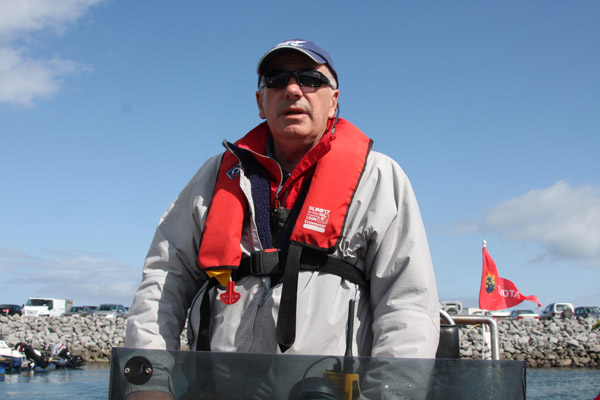
Barry Rose Chaired the ICRA Conference in Dun Laoghaire
The format this year created an inter active discussion in the morning session on Class Bands and the promotion of participation in Cruiser Racing in general. A lively, frank discussion took place with strong views being expressed by most present highlighting the problem of attracting crews to enable boats to go racing and creating access to allow those interested to go sailing to participate in the sport.
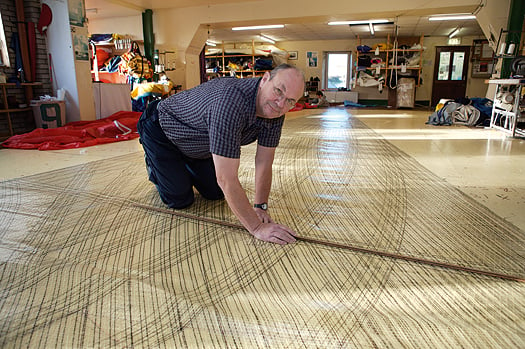
Des McWilliam spoke passionately about Irish sailing - Photo: Bob Bateman
Sailmaker Des McWilliam made a strong appeal that the future of the sport was threatened by difficulty in accessing getting afloat and sailing by the Club structures that were becoming more of a closed shop approach. Maurice O'Connell also spoke passionately on the same subject and examples were given of difficulties encountered both In Cork and Dublin in gaining access to participating in sailing and racing while boats were remaining tied up for lack of crews.
An understanding of the dilemma for the Clubs was also expressed by Flag Officers present in maintaining their facilities for those paying membership while encouraging new sailors to gain access at reasonable cost for a period.
It was agreed that all present would make every effort on a personal basis to encourage opportunities for those interested to go sailing to gain opportunities on boats and access to Club introductory offers.
ICRA will also explore creating an on line vehicle for available crews to register so boat owners gain opportunity to make contact.
There was also suggestions aired that bottom end of Class 1 should be included in Class 2 where all would have better racing.
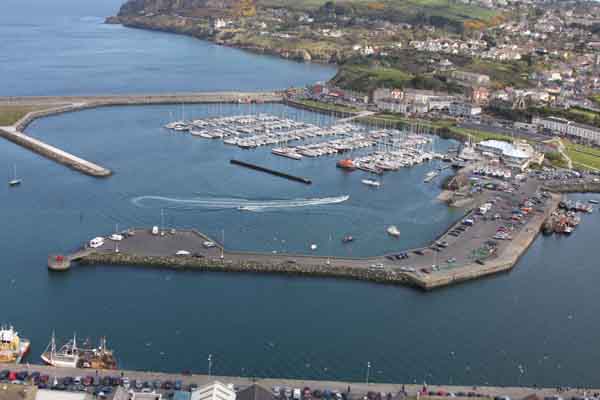
Howth, the venue for the 2012 ICRA Champs
The Royal Cork Yacht Club was complimented for running a top Class ICRA National Championships in June. Howth Yacht Club gave an update that arrangements are well progressed for an exciting ICRA National Championships in Howth 25th to 27th May 2012. The previous weekend will host the Corby Cup which will encourage those travelling to participate in Nationals and ISORA will run a feeder Race from Wales. It is hoped to announce a Sponsor shortly. Howth plan the first Race for 1600 hrs on Friday to avoid necessity for those travelling to stay over on Thursday.
The main feature of the afternoon session was a similar open forum with Race Officers Jack Roy, Henry Leonard and Harry Gallagher joining the top table for an open discussion on course types that sailors wanted and communications sailors would like with Race Officers. This was also a lively session with frank constructive exchanges which was of benefit to sailors and Race Officers alike.
The feeling of the meeting was that in addition to windward /Leeward courses sailors wanted a good variety of course types both at National Championship level but also at Regional events. Also those present strongly requested that boats over the line at starts be informed whenever possible but on strict understanding in Sailing Instructions that there be no redress in any circumstances relating to same against Race Officers.
Both these forums provided an excellent opportunity for those attending to air their views on all matters relating to Cruiser Racing and to offer ideas and this will be developed further for future conferences.

Commodore's Cup Captain Anthony O'Leary. Photo: Bob Bateman
The Commodore reported on efforts to form a team to defend the Commodore's Cup in 2012 and Anthony O'Leary brought the meeting up to date in changes to the event format and expressed confidence that there would be a positive response to ICRA 's request for declarations of interest to form a credible team to defend the Cup as is Ireland's responsibility.
Denis Noonan of Wicklow Sailing Club expressed the Clubs upset and disappointment that an Irish Club would arrange a competing event The Round Rockall Race from Galway starting on the same day as their Iconic Round Ireland Race. They outlined their plans for the 2012 Round Ireland Race and received support for their efforts from those attending. The RORC has increased their points scoring for the Round Ireland Race as further recognition of its standing in World offshore racing. Both ICRA and the ISA confirmed their support for the Round Ireland Race.

Pat Kelly's Storm is ICRA's Boat of the Year. Photo: Bob Bateman
The Conference finished with the presentation of the magnificent crystal ICRA Boat Of The Year trophy for 2011 to Pat Kelly's J 109 Storm who won the ICRA Nationals in Cork in June, The Cruiser Challenge in Dublin in August, The Howth Autumn Series and also travelled to the Scottish Series and Sovereigns Week. It was felt she embodied the spirit of a well campaigned ICRA cruiser racer. A week later Kelly became Afloat's Sailor of the month for November.
Pat Kelly is Afloat's Sailor of the Month for November
#SAILOR OF THE MONTH – Pat Kelly of Rush Sailing Club is the Afloat.ie/Irish Independent "Sailor of the Month" for November after his J/109 Storm - crewed by fellow-Fingallions - was celebrated as the Irish Cruiser Racer Association "Boat of the Year" at the ICRA annual general meeting in Dun Laoghaire at the weekend.
The sailors of north Fingal are on a roll these days. Back in September, Matt Davis of Skerries won our monthly award after his Sigma 400 Raging Bull retained the Irish Sea offshore championship. And another Skerries sailor, windsurfer Oisin van Gelderen, continues to be Ireland's fastest man afloat, his current official best speed being 44.23 knots.
Now it's the turn of Rush to top the podium. Not that Rush is new to successful sailing. Once upon a time, it was the top port on the east coast of Ireland for smugglers who veered into privateering and occasionally even piracy. To succeed in any of these activities, they needed fast ships and able skippers, and captains like Luke Ryan and James Mathews gave Rush its formidable sailing reputation.

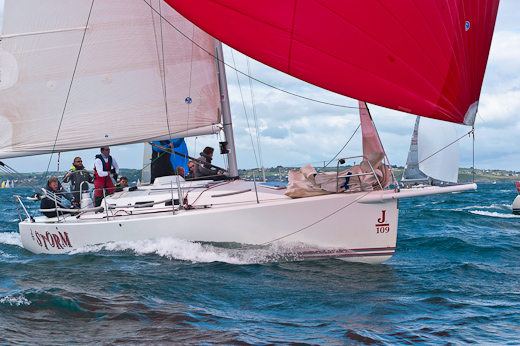
Storm was made ICRA Boat of the year last weekend and this Saturday her skipper Pat Kelly becomes Sailor of the month for November. Photos: Bob Bateman
Highlight of Pat Kelly's season with Storm was his outright class win in the ICRA Nationals at Crosshaven. Five wins in six races is the sort of performance that would get the Luke Ryan/James Mathews seal of approval. Storm was also regularly in the frame in many other major events, and had frequent success in regattas and club racing with a dedication to sailing that does her skipper and crew proud.
Pat kept his previous 30-footer in the tide-riven anchorage at Rogerstown off Rush SC's attractive south-facing clubhouse, one of the few south-facing sailing clubhouses in the entire country. However, with the bigger boat it was necessary to find a berth at Howth, and in fact Storm sails as a joint HYC/RSC entry. But the club in Howth wouldn't begrudge this success to their smaller neighbours to the north. And with their own marina in fine shape (it hosts next year's ICRA Nationals in late May), they'd be the first to agree that the only thing holding back north Fingal sailing from even greater achievements is the lack of sheltered and conveniently accessible pontoon berthing on the entire coast between Malahide and Carlingford Lough.
More from WM Nixon in the Irish Independent here
Howth Plans Big Event for 2012 ICRA Nationals
ICRA – the 2011 Club of the Year – laid out its stall until 2014 at the eighth annual conference in Dun Laoghaire at the weekend and the momentum is already building at Howth Yacht Club (HYC) who stage the 2012 National Championships at the beginning of next season.
The country's biggest yacht club has a potential sponsor in the wings and Saturday's conference also heard from the Club's Norbert Reilly that HYC is adding feeder events around the two day championships from May 25/27 to double the attraction of the North Dublin venue.
The Corby Cup will be sailed the weekend prior to the Nationals (19-20 May) and the Irish sea offshore body, ISORA, will stage a feeder race from Conwy in Wales to Howth. Both initiatives will encourage UK boats to travel to Dublin for the ICRA series.
Typically the ICRA event attracts over 100 boats in four different classes.
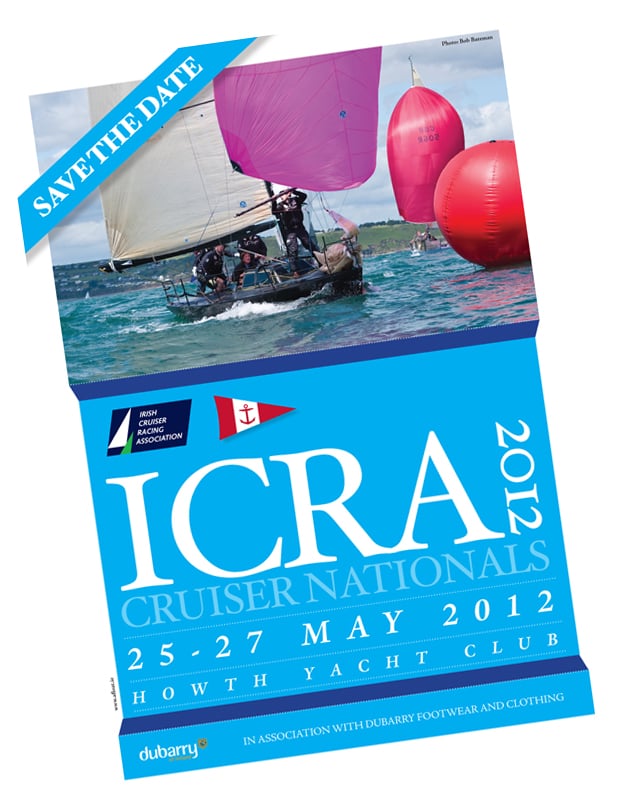
In spite of a dip in the size of the Cruiser fleet in Howth in recent years local boats are still taking some of the big prizes nationally with Reilly's Crazy Horse the 2011 Volvo Dun Laoghaire and DBSC Cruiser Challenge winner and Pat Kelly's J109 Storm picking up the weekend conference's top 'Boat of the Year' prize.
Ashore there are plans to make the event family oriented and a 'ladies lunch' is also planned.
The weekend's ICRA conference decided to do away with the crew limit rule for the seven race series in Howth as the association focuses on getting more crews out on the water to enjoy cruiser racing.
The ICRA Nationals goes West for a return visit to Tralee Bay Sailing Club in June 2013 and in 2014 the National Championships will be staged by the Royal Irish Yacht Club in Dun Laoghaire.
In the normal cycle of things 'the ICRAs' should be heading to the south coast again in 2015 but so far, the conference heard, the association is open to offers.
The 2012 ICRA Notice of Race for the Howth Championships will be available on Afloat.ie shortly
Lough Derg Lifeboat Rescues Five People from Cruiser on Rocks
At 09.49hrs the lifeboat launched, with helm Eleanor Hooker, Peter Clarke and Colin Knight on board. The lifeboat carried its salvage pump. The wind was southwest, Force 3 to 4 gusting 5 (9knots gusting 18), with visibility very good. At 10.12hrs the lifeboat was alongside the casualty vessel which was listing severely to starboard and on rocks. There were five persons on board, all safe and unharmed and wearing lifejackets. Two RNLI crew members went on board to assess damage to the vessel and, finding that she was holed and taking on water, it was decided to take all persons onto the lifeboat and transfer them to Castle Harbour where they were met by the rest of their group. The lifeboat thanked the skipper of Laura for standing by. The lifeboat returned to station and was ready for service at 12midday.
ICRA Seek Team for Defence of 2012 Commodore's Cup
The Irish Cruiser Racing Association (ICRA) is seeking expressions of interest from owners to form an Irish team to defend the Rolex Commodore's Cup next July.
ICRA Commodore Barry Rose says that despite the current difficult environment ICRA remains hopeful of mounting a serious defence and have waited until now to allow the maximum time to those who may consider supporting the challenge.
The Rolex Commodores Cup takes place from 21st to 28th July 2012 based in Cowes. Ireland first won this prestigious International Trophy in 2010 .
Captain of the winning team Anthony O Leary told Afloat.ie: 'We finally won this great event in 2010 with a well organised campaign. Let's hope we
can return to defend it in 2012 learning further from that experience'
The regatta format has been changed by event organisers the RORC in that the smallest boat will now have a minimum rating of 1.020 with the biggest boat maximum rating of 1.230. There will be only one boat per team allowed to rate in excess of 1.150.
This means there will no longer be three separate classes so all starts will be all in which will add to the excitement and spectacle of the event.
Countries will be free to decide on their own combination of boat sizes within the above bands which will add further to the intrigue of this non discard seven day test of inshore and offshore racing.
ICRA is asking for potential interested owners to make contact with them as soon as possible in order that a meeting can be held within the next month to advance ideas on how best to mount a successful defence.



























